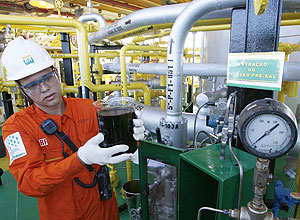Latest Photo Galleries
Brazilian Markets
14h53 Bovespa |
-0,22% | 124.861 |
16h43 Gold |
0,00% | 117 |
15h03 Dollar |
+0,37% | 5,1482 |
16h30 Euro |
+0,49% | 2,65250 |
ADVERTISING
Chinese Companies Lead the Bidding for Brazilian Oil Reserves
09/24/2013 - 09h01
Advertising
DENISE LUNA
FROM RIO DE JANEIRO
Last year China overtook the United States as the world's largest importer of oil. The Chinese currently consume nearly 10 million barrels a day, a figure five times greater than that for Brazil.
No surprise then, that three of the eleven companies due to participate in bidding for the rights to the Libra oilfield, Brazil's largest oil reserve, are Chinese. The area, located in the Santos Basin, is forecast to produce 1 million barrels of oil a day by 2020. This figure is half of that which Petrobras took 60 years to reach.
The Chinese investment is a sure sign the bidding war will be fierce. "They are buying the reserves," says Jean Paul Prates, director of the Strategy Center for Natural Resources and Energy. "This is everything that China wants - a competent local operator [Petrobras] and guaranteed reserves involving less risk than in other countries."
| Eraldo Peres/AP |
 |
| The sale is also a boon for Petrobras. With cash tight due to the delay in fuel adjustments, pre-salt layer oil currently represents the company's most likely source of profits. |
Competing in the bidding will be CNOOC (China National Offshore Oil Corporation); CNPC (China National Petroleum Corporation) and Sinopec, in partnership with the Spanish company Repsol, with which it has already worked in Brazil.
As China has changed in recent decades, becoming a predominantly urban country, these companies have grown, leading the search for alternatives to coal.
For Prates, China, like Japan - now urgently searching for new sources of energy following the Fukushima nuclear disaster in 2011 - is going to be assertive in its bidding. But it is the Chinese, he says, who "will sit down and write the checks."
The sale is also a boon for Petrobras. With cash tight due to the delay in fuel adjustments, as well as 770 projects in progress and a further 177 being assessed, pre-salt layer oil currently represents the company's most likely source of profits.
The company owns proven reserves of 3.4 billion barrels in the Santos Basin, and in little more than five years has managed to achieve production of around 300,000 barrels daily.
The Libra oilfield has estimated reserves of a further 8 to 12 billion barrels. Its exploration will mark the beginning of a new arrangement under which the government will be paid in oil. The money left over once production costs are taken into account will be divided between members of the winning consortium.
Current market speculation suggests that Petrobras is likely to increase its share in the reserves, from the mandatory 30% to somewhere around 50%, dividing the reserves with a Chinese partner.
Translated by TOM GATEHOUSE



